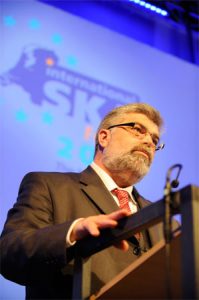
Senator Carr presenting at the International SKA Forum 2010, Assen, Netherlands. Credit: Hans Hordijk
Eleven ICRAR staff participated in the International SKA Forum (ISKAF) 2010 last week, at Assen, Netherlands. Dr Bernard Bowen, Chairman of the Board and the executive team, joined by five other staff, represented ICRAR at this important milestone in the planning and preparation for the SKA.
ISKAF brings together scientists, engineers, politicians and industrial partners with an interest in the SKA. It consisted of a series of meetings and events, culminating in the forum itself on the 15th of June.
Senator the Hon Kim Carr, Minister for Innovation, Industry, Science and Research addressed the forum attendants, discussing Australia and New Zealand’s bid to host the SKA.
“Australia and New Zealand have one goal – and that is to work with the world to achieve the best possible SKA. We want to make the most of the opportunities the telescope will bring,” said Senator Carr.
“We believe we have much to offer the SKA project, including an ideal site.”
ICRAR is working closely with the CSIRO and other organisations from Australia and New Zealand to prepare for the SKA, and showcase the strength of the proposed site in Western Australia.
Prof Ron Ekers, Chair of the ICRAR Science and Technology Advisory Committee and Adjunct Professor of Radio Astronomy at Curtin University provided the opening address for ‘The New Golden Age of Radio Astronomy’ meeting. Other ICRAR contributions to the meeting generated sizeable interest and included presentations on science with the Australian SKA Pathfinder.
ICRAR was also represented at the Connect Industry, Science and Society Workshop, where a timely decision on the final site for the SKA was encouraged.
During the forum LOFAR, the ASTRON Low Frequency Array based in the Netherlands, was inaugurated by Her Majesty the Queen of the Netherlands. This exciting new radio telescope is an important step on the way to the SKA and forum participants attended the launch.
One significant outcome from the forum was an agreement on the terms of reference for a site recommendation.
“The terms of reference specify quite plainly that the site selection process should be ‘in the best interests of the SKA as an international scientific facility’,” says Senator Carr.
This will allow the SKA to achieve maximum discovery, a position that the Australian and New Zealand partnership has welcomed.
ICRAR Deputy Director Professor Peter Hall also participated in the SKA International Engineering Advisory Committee (IEAC) meeting in Manchester this week. The IEAC advises planning for the SKA with updates on progress and issues in the international and regional SKA endeavours.
More information on the International SKA Forum 2010.